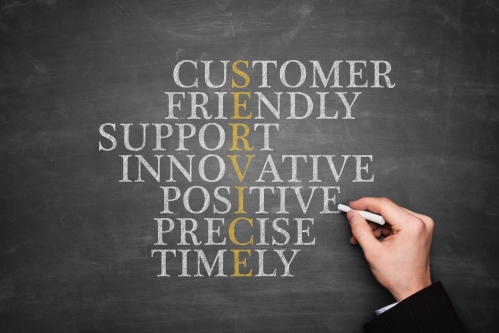You see countless articles every day that claim improving a single part of your customer service strategy is the “key” to something. Experts promise how listening to your customers, delivering more timely service, improving employee training and many other things offer a path to providing a better customer experience. The reality is that your customer service is like a machine with many moving parts. These parts include your call center’s hold times, your field sales teams’ ability to make an emotional connection, the helpfulness of information available on self-service portals and more. They all need to function well, and – most importantly – function well together in order to offer an amazing customer experience and rank among the best names in stellar service. Ultimately this requires a customer culture (read more in our new book here)
The most well-known companies in customer service have earned their reputation by recognizing and executing against this reality. This is demonstrated in call center reviewer Ashley Verrill’s recent article, which examined how Zappos perfects quality assurance management for a better customer experience. QA is not typically showcased as a big part of the “machine,” but the Zappos strategies she highlights do more than improve the accuracy and fairness of agent scoring. They also involve the voice of the customer and service reps to improve the experience for all parties involved:
Quality Assurance and Customer Service Reps Join Forces: Each QA team “advocate” is required to spend at least five hours on the floor, taking calls. This helps them stay connected to the real challenges and opportunities reps face on a daily basis and promotes active participation between the two groups.
Scoring Weighted to Reflect Zappos’ Values: (which you can view here): The scores that have the greatest impact on the overall quality assurance score are those in categories that do more to deliver the “Zappos Experience.” The most important factor for Zappos is forging a personal emotional connection with every customer. Also important is the solution to the issue. Knowing what’s most important to your company helps you evaluate your reps based on what matters most.
Self-Check Sessions: Every six months, Zappos evaluates its QA form and asks agents to grade their own calls. This not only helps continue the improvement of QA evaluation – it also empowers agents to voice opinions and innovative ideas.
Involve the Customer: Zappos manages call quality using traditional methods such as traditional Net Promoter Scores, as well as more unique strategies including “sharing great calls” and “customer props.” Again, this empowers the agent to tout an exceptional connection they made with a customer and also gives a voice to the customer, who is invited to give his or her take on the experience.
Custom Coaching with a Clear Path of Progression: Although Zappos has certain standards in place for measuring QA, team leaders are encouraged to personalize training exercises to best fit the learning style of the rep. Providing customized coaching optimizes the agent’s learning potential, interest levels and excitement. Zappos’ leaders take it a step further by outlining exactly how reps will move to higher-tier roles – creating an incentive for reps to continuously be improving their service quality.
You’ll find a pattern with the majority of Zappos’ tactics for quality assurance management: they are constantly creating opportunities for feedback. Whether that feedback comes from the customer, the agent, the QA team or management, all suggestions are welcomed as vehicles for innovation. It doesn’t matter which part of your customer service “machine” you’re working to improve – when you incorporate viewpoints of all parties involved, the closer you get to providing stellar customer experiences.




